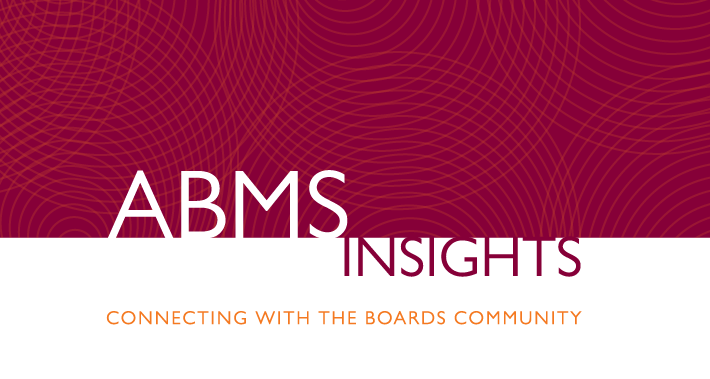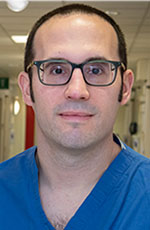
By Brian T. Garibaldi, MD, MEHP, Director of the Johns Hopkins Biocontainment Unit and Johns Hopkins COVID-19 Precision Medicine Center of Excellence; Associate Professor of Medicine of Physiology, Division of Pulmonary and Critical Care Medicine, Johns Hopkins University School of Medicine; Associate Program Director, Osler Medical Residency Program

When I was chosen as an American Board of Medical Specialties (ABMS) Visiting Scholar in the Class of 2017-2018, I never anticipated how it would advance my passion to improve the bedside experience for patients.
My Visiting Scholars research project was one of the first to be co-sponsored by the Gordon and Betty Moore Foundation, which champions improved patient experiences and outcomes. Rekindling the Culture of Bedside Medicine: A Novel Methodology to Assess and Teach Physical Examination Skills focused on preserving the skills associated with performing physical examinations. This pilot study not only validated the methodology, but residents gained knowledge and skill sets for performing physical exams while faculty members gained skills for teaching what was becoming a lost skill. The study was expanded thanks to grants from the Center for Innovative Medicine and Institute of Excellence in Education at Johns Hopkins, and the New York Academy of Medicine.
My research project led me to become a founding member and first co-president of the Society of Bedside Medicine (SBM), an organization composed of clinicians dedicated to enhancing the clinical encounter with the patient. Our goal is to foster a culture of bedside medicine through deliberate practice and teaching, and by encouraging innovation in education and research on the role of the clinical encounter in 21st century medicine.
“I am grateful for all I learned from my experience as an ABMS Visiting Scholar and encourage early-career physicians to see for themselves how it can support, and even amplify, their career aspirations, whether they are focused on patient care, education, or research.”
One of the opportunities I enjoyed most about the ABMS Visiting Scholars Program™ was the chance to engage in discussions with health care thought leaders, including decision-makers at national health care organizations. It was incredible to me that these influential leaders genuinely wanted to hear about our projects and valued our opinions about the future of board certification and medicine. It was during one of these meetings that I made an invaluable connection with a leader from the American Medical Association (AMA), an ABMS Associate Member. That conversation set in motion further expansion of the methodology to Stanford University and University of Alabama at Birmingham, both of which are founding members of SBM. Together, our three institutions were awarded a $1.8 million Reimagining Residency grant from the AMA to generate, implement, and evaluate interventions to improve resident burnout and clinical skill.
Additionally, I have continued my relationship with the Moore Foundation. Last year, SBM partnered with the Moore Foundation and Johns Hopkins’ Department of Medicine to create a Bedside Medicine Fellows Program that provides support for two fellows each year for the next three years. This program will create a community of talented clinician-educators and researchers who recognize the value of the bedside encounter in improving diagnostic accuracy and overall patient care.
In my role as an intensive care unit physician and director of the Johns Hopkins Biocontainment Unit, I have cared for hundreds of COVID-19 patients during the past two years and experienced the challenges that the pandemic has created for patient care. Due to COVID-19’s highly contagious nature, many hospitals have had to restrict family visitation. Bedside rounds have frequently been moved to the hallway or conference room to allow for social distancing and to preserve personal protective equipment. Teaching clinicians how to provide empathetic, yet structured and consistent bedside care to lonely and frightened hospital patients, while communicating effectively with their families, has never been more important.
I am grateful for all I learned from my experience as an ABMS Visiting Scholar and encourage early-career physicians to see for themselves how it can support, and even amplify, their career aspirations, whether they are focused on patient care, education, or research. The ABMS Visiting Scholars Program has helped shape the physician I am today by affording me opportunities that I could not obtain elsewhere. It’s hard to believe that it has been five years since my ABMS award. I am excited to see where the next five years take me.
© 2022, American Board of Medical Specialties
Read more about the Visiting Scholars program.
